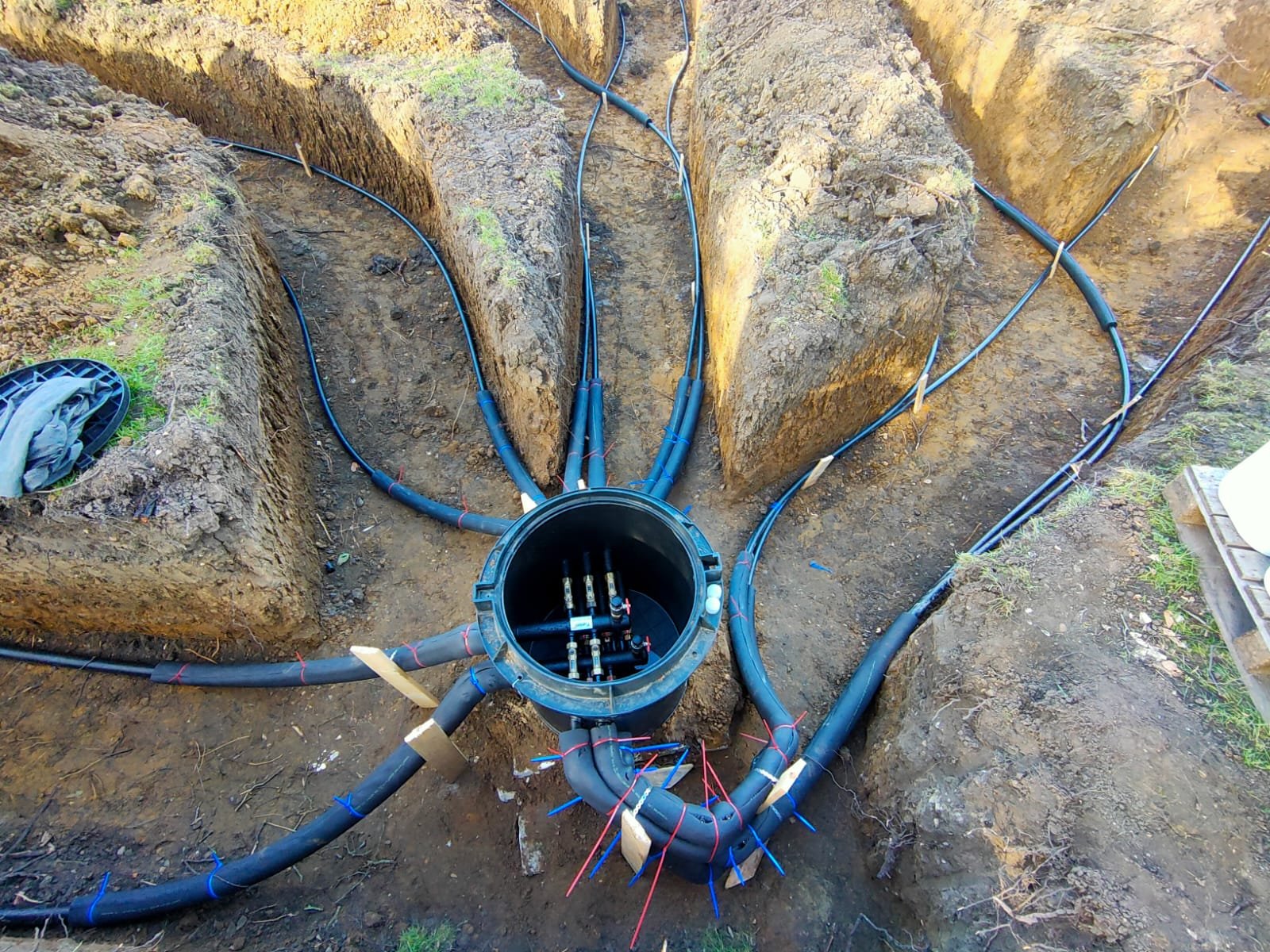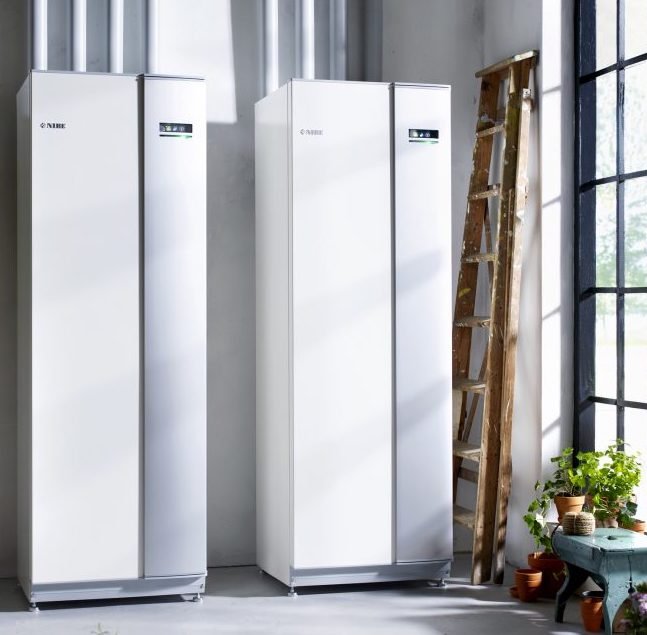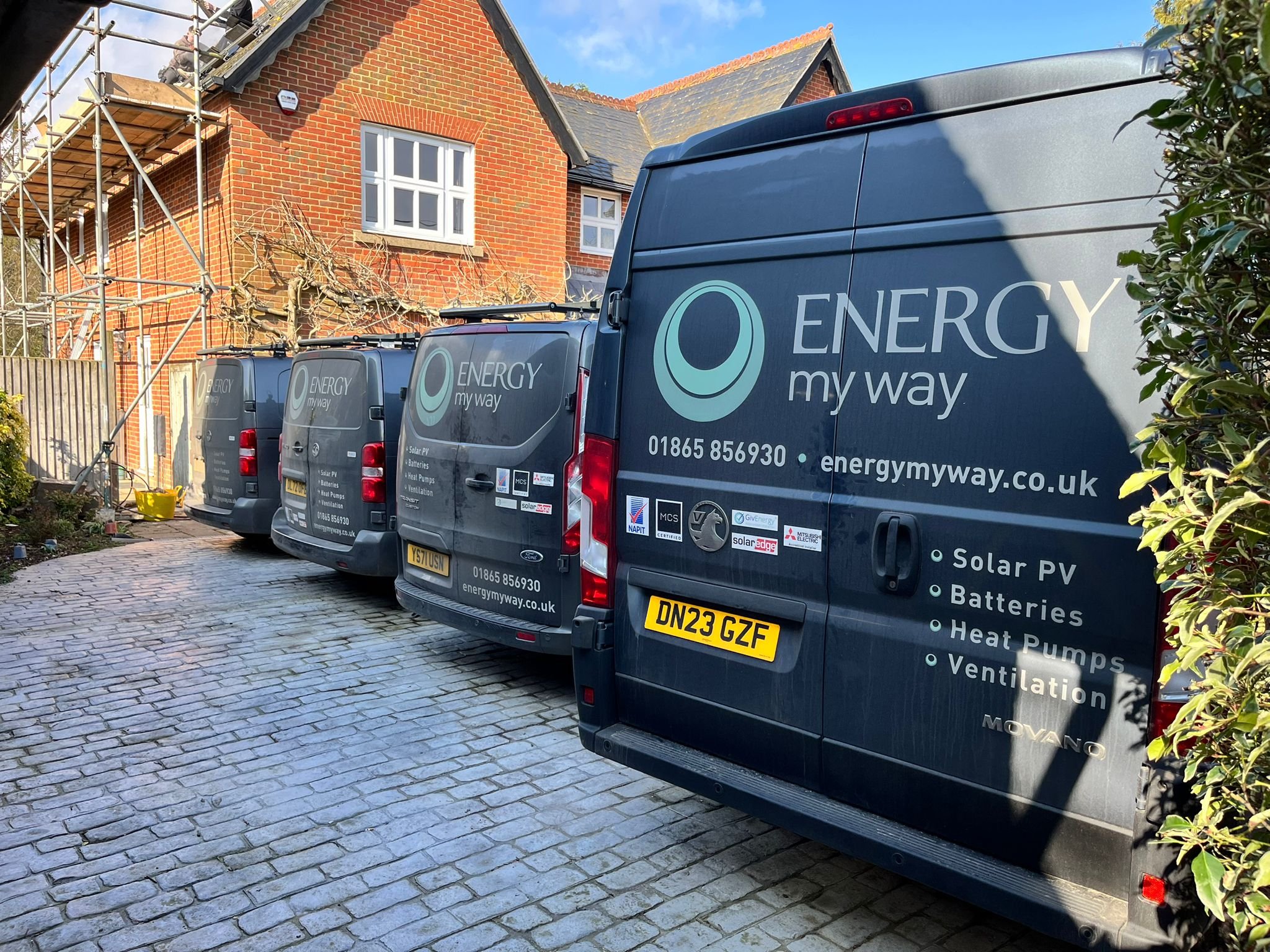
Ground Source Heat Pump Installation
“We had a major ground source heat pump installation in our new build house and had researched many companies before selecting EnergyMyWay. James and the team have been very responsive and easy to deal with, including assistance with the Government grant application, and I would certainly recommend them highly.”
— Martin Blakstad, 2022 (Google review)
Designed to cover 100% of the space heating and domestic hot water requirements
An efficiency up to 4.5 times greater than a gas boiler
Eligible for a £7,500 Boiler Upgrade Scheme grant
How a Ground Source Heat Pump (GSHP) Works
A ground source heat pump system extracts heat from the earth through a network of pipes buried underground. These pipes, filled with a mixture of water and antifreeze, absorb the naturally occurring thermal energy stored in the earth. The GSHP then concentrates this thermal energy, raising it to a higher temperature suitable for heating your home.
This process is remarkably energy-efficient because it leverages the consistent and stable temperatures found below the earth's surface. Unlike traditional heating systems that rely on burning fossil fuels, a GSHP reduces carbon emissions and lowers operating costs by tapping into this renewable and sustainable geothermal energy. As a result, a GSHP provides an eco-friendly and cost-effective solution for long-term energy efficiency, ensuring a comfortable living environment while minimising your environmental footprint.
“The EnergyMyWay service is exceptional. We have been very well looked after and given all the information we need to make the right choice. The installation team have been highly professional, we are delighted with the whole process and very excited about our new system.”
Sara McDouall, 2023 customer (Post-installation questionnaire)
The Ground Collector
The efficiency of a GSHP system largely depends on the design and installation of its ground collector, which is the network of pipes responsible for extracting heat from the earth. There are two primary methods for installing these pipes:
Horizontal Ground Collectors: With this method, pipes are buried approximately 1 metre below the ground's surface. This setup is generally more cost-effective, making it a popular choice for many homeowners. However, it requires a large area of land to accommodate the extensive piping network.
Vertical Boreholes: Alternatively, the pipes can be installed in vertical boreholes drilled deep into the ground. This requires significantly less surface area, making it suitable for properties with limited space, but it is often more expensive due to the cost of drilling the boreholes to the required depth.
The choice between these two systems depends on various factors, including the available land space, budget, and the specific heat load requirements of the property. A thorough assessment of your home and its heating needs will help determine the most suitable and cost-effective solution.
The Perfect Installation Partner for You
To ensure that a GSHP is the right choice for your home, a detailed room-by-room heat loss report is essential. The report can be generated either from architectural plans or through an on-site survey of your existing property. This allows us to accurately determine your heating needs and design a system that will provide optimal performance.
Once the assessment is complete, we’ll prepare a comprehensive and fully costed proposal tailored to your specific requirements. Our in-house installation team, with extensive experience in installing GSHP systems, will manage the entire process, ensuring a seamless and professional installation. With a proven track record of successful installations, EnergyMyWay is the ideal renewable energy partner for your project.
Where We Work
At EnergyMyWay, we provide ground source heat pump installations across the southeastern regions of Oxfordshire, Berkshire, Buckinghamshire, Hertfordshire, Surrey and Kent. We provide tailored renewable heating solutions for a diverse range of property types, from rural farmhouses to urban townhouses. Our skilled team of engineers design and implement sophisticated heating systems that extract renewable thermal energy from the ground to significantly reduce carbon emissions and energy costs for each unique property.
We specialise in adapting ground source heat pump technologies to varied geological conditions, ensuring optimal performance across different terrains. Using advanced bore drilling and heat exchange techniques, we maximise efficiency for both modern and historic properties. Our expertise spans the clay-rich soils of Kent, the chalky landscapes of Surrey, and the diverse terrains of Oxfordshire and Hertfordshire, allowing us to tailor each installation for consistent, sustainable heating. With a highly skilled team bringing regional knowledge and technical precision, we deliver efficient, environmentally friendly solutions that meet specific heating needs.
“We have a new build where EnergyMyWay were engaged by the housebuilder to integrate a heat pump system. This works well and is quiet and effective. We are particularly impressed by how responsive the team is - James has always jumped onto issues if they arise and helped resolve them quickly. We also asked them to install PV panels which are integrated well into the overall home energy context.”
Robert Flint, 2023 customer (Google review)
Boiler Upgrade Scheme (BUS)
One of the significant financial incentives available for GSHP installations is the Boiler Upgrade Scheme (BUS). Under this scheme, homeowners can qualify for a grant of up to £7,500 to offset the cost of installing a GSHP. As your installer, we handle the application process on your behalf, and the grant is paid directly to us, reducing your out-of-pocket expenses.
Contact us today to find out more.
Ground Source Heat Pumps FAQs
-
The space required depends on whether you choose horizontal ground collectors or vertical boreholes. Horizontal systems need more land area, while vertical systems require less space but involve higher installation costs.
-
A well-maintained GSHP can last for 20 years. Nibe GSHP’s come with a 7-year manufacturer’s warranty. Regular maintenance is essential to ensure longevity and efficiency.
-
GSHP installation costs vary depending on the system type, property size and specific heating requirements. However, the Boiler Upgrade Scheme (BUS) grant can significantly reduce these costs. Contact us for a precise quote.
-
In most cases, GSHP installations are considered permitted developments and don’t require planning permission. However, it is advisable to check with your local planning authority to confirm this before the installation begins.
GSHP systems are installed by our EnergyMyWay installation team of directly employed, experienced and fully qualified engineers
Contact us today to discuss your heat pump project and to experience our full design, supply, installation, and service.
We offer expert Ground Source Heat Pump services across Oxfordshire, Hertfordshire, Surrey and Kent.
From our office in Oxford, our specialist engineers provide local renewable energy solutions to suit your property’s specific needs.
You can give us a call at 01865 856930, send us an email at info@energymyway.co.uk,
or fill in the form by clicking the button below.
Learn more by visiting our Resources section or read some of our Case Studies.








